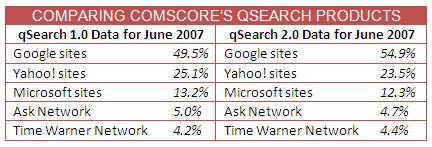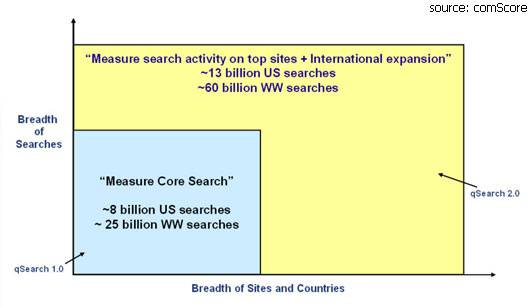comScore today announced changes to their search tracking service, qSearch, which they say will better meet the needs of what is a continually evolving search market. The key take aways from qSearch 2.0 are an expanded global data set, a better understanding of vertical search, better counting of “multi-tab searches,” and the counting of hosted or affiliate search.

comScore will also provide a break down of searches performed on additional properties owned by core search sites, though these numbers will not be included in the “core search” market share numbers for consistency’s sake. For example, in July 2007 Google served 6.6 billion searches, but more than 1.1 billion were performed on YouTube. Those YouTube numbers are counted by qSearch 2.0, but not included in the core search share metric.
Steve Dennen, the Senior Director of Market Research at comScore, provided some examples to illustrate what the company views as an evolving search landscape during a webinar this afternoon. A “classic” search example would be a Google query for “George Bush parody.” But now, that same search might be performed on YouTube, where the user intent is to find a video parody of the US president, or on Amazon, where the user might be looking for book, DVD, or CD, or on MySpace, where maybe the user is looking for blog posts or profile mentions about that topic. The same query could also be performed on Wikipedia, where the user might be looking for historical background on George Bush parodies.
“Over the last two years or so we have seen an increased blurring of what we’d call classic search,” said Dennen, who said that this example shows how web 2.0 is influencing and changing our attitude toward search, echoing comScore’s CEO Dr. Magid Abraham from their qSearch 2.0 press release.
“comScore is leading the way in measuring a search landscape heavily affected by Web 2.0. qSearch 2.0 adapts to the blurring of ‘classic search’ and enables clients and research analysts to evaluate the newly emerging players and the new types of searches that can potentially have significant monetization opportunities.” — Dr. Magid Abraham
Dennen also talked about affiliate, or hosted search. Web seaches that originate from third party sites are now counted by qSearch 2.0. For example, if you visit the CNN.com site, and perform a Google web search, that search is now counted in the qSearch metrics. Only web searches are counted, however. Google-powered searches of CNN.com, for example, would not be counted. This change benefits Google the most, according to comScore, who have, at least anecdotally, had a much greater success rate in getting third party sites to install their affiliate search engine than their competitors. Google experienced the largest jump in search share among the top 5 when comparing qSearch 2.0 data to qSearch 1.0 data for June 2007.

qSearch 2.0, because of a greatly expanded data set, also now has the ability to measure verticals separately and more accurately. comScore plans to expand their measurement offerings to verticals such as jobs, travel, and retail searches. qSearch 2.0 also measures what comScore calls “multi-tab” searches as separate queries. This means that if someone performs a web search, and then clicks on the “Images” or “News” tabs, those are considered separate searches by qSearch 2.0, whereas they had been considered one search with multiple results pages in the past. The reason for this is two-fold, according to Dennen, first that consumer intent is different for each search, and second that monetization is different for each of those verticals. This change also disproportionately favors Google.
Perhaps the biggest change, however, in qSearch 2.0 is their expanded data set. qSearch reporting now includes the top 50 sites world wide where search activity occurs. This includes MySpace, YouTube, Baidu, eBay, Craigslist and a host of others, in addition to major search-specific properties. qSearch 2.0 is also expanding their international sample size. In the past, qSearch only measured data from the US, UK, Germany, Canada, and France (as well as aggregate data from the rest of the world). Version 2.0 now measures China, Japan, Korea, and Mexico, with Italy, Spain, and Brazil coming next month. India, the Netherlands, Russia, and Argentina are scheduled for inclusion in September.

qSearch 1.0 would have measured 8 billion US searches, and 25 billion world wide searches last month, but qSearch 2.0 measured 13 billion searches in the US and 60 billion world wide. This expanded data set, and the measurement of previously unmeasured multi-tab searches and searches originating from third party sites will give “the most comprehensive and accurate view of the entire search market” according to comScore.
In reality, however, it seems that the share among the top 5 has not changed all that much. Google makes significant gains as a result of the new qSearch reporting, while the others mostly slip marginally. Overall, though, the picture of the search landscape remains largely the same.










